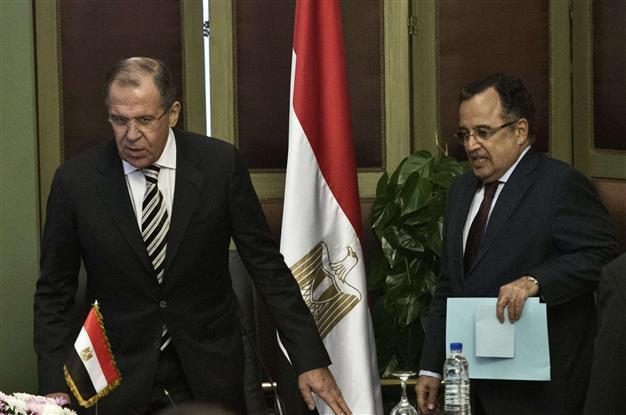Egypt not replacing US with Russia as top ally
CAIRO

Egyptian Foreign Minister Nabil Fahmy (R) and his Russian counterpart Sergey Lavrov arrive to give a press conference on November 14, 2013 in the Egyptian capital, Cairo. AFP photo
Egypt’s foreign minister sought to downplay speculation of a major foreign policy shift, saying during a rare top-level Russian visit Nov. 14 that Cairo merely wants to boost ties with Moscow, not replace the United States with Russia as its key ally.The remarks by Nabil Fahmy came after talks with his visiting counterpart, Sergei Lavrov, who is leading the Russian delegation to Cairo. The trip is Moscow’s highest-level visit to Egypt in years and includes Russia’s defense minister, Sergei Shoigu, whose presence has set off rumors of an arms deal in the making.
Fahmy, Lavrov, Shoigu and Egyptian Defense Minister Gen. Abdel-Fattah al-Sisi jointly met later in the day. Depicting the meeting as an “activation” of existing ties, Fahmy said Egypt hoped for cooperation “in multiple fields” because of “Russia’s significance in the international arena.”
“We seek to energize a relation that is already in existence,” Fahmy told reporters.
When asked whether Russia would replace the U.S. as his country’s chief ally, Fahmy said Egypt was not looking for a “substitute for anyone” and that Russia was too significant for such a role.
“Russia has had a relationship with the Egyptian people for dozens of years,” Lavrov said, speaking through an interpreter. He described the meeting as “historic.” Al-Sisi also told his Russian counterpart that the visit indicated the continuation of “historic strategic relations via starting a new era of constructive, fruitful cooperation on the military level,” the state news agency reported.
The Russian visit comes as Egypt’s relationship with the U.S. has become increasingly strained in the wake of the military’s ouster of President Mohamed Morsi.
Egypt was Moscow’s closest Arab ally for two decades, starting in the 1950s, with the Soviet Union throwing its weight behind the late nationalist leader Gamal Abdel-Nasser in his ambitious drive to modernize the Arab nation and create a well-armed military at the height of the Cold War and the Arab-Israeli conflict.
But in 1972, then-President Anwar Sadat threw out thousands of Soviet military advisers and realigned the country’s foreign policy, taking his nation closer to the U.S. soon after the 1973 Yom Kippur war.
Egypt’s relations with the USSR took a marked turn for the worse after Moscow’s invasion of Afghanistan in 1979, but relations have steadily improved in recent years, with hundreds of thousands of Russians vacationing in Egypt every year.
The U.S. last month froze a big chunk of its annual $1.3 billion military aid to Egypt. The move angered the Egyptians and prompted speculation in the local media that Egypt intended to sign a multi-billion dollar weapons deal with Russia. But there has so far been no official word from Cairo or Moscow on such a deal.
The Interfax news agency recently quoted an unidentified official of the state Rosoboron export arms trader as saying that there are no plans to sign big contracts during the Cairo talks.
It said Egypt has shown interest in purchasing Russian missile defense systems and MiG-29 fighter jets, combat helicopters and other weapons. But it quoted an unnamed official dealing with arms trade as saying that no big deals are expected in the near future as Egypt currently cannot afford such agreements. A Western diplomat in Cairo also said the prospect of the U.S. resuming aid early next year was one factor diminishing the chances of a major new defense deal with Moscow.
















